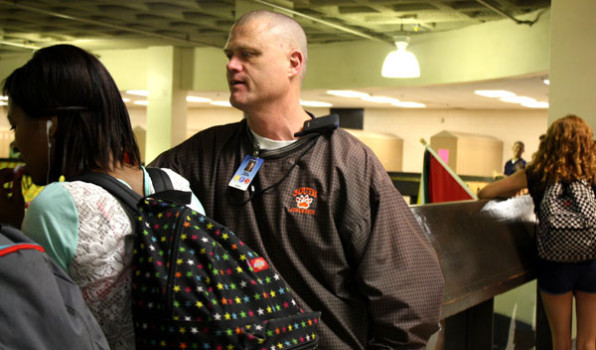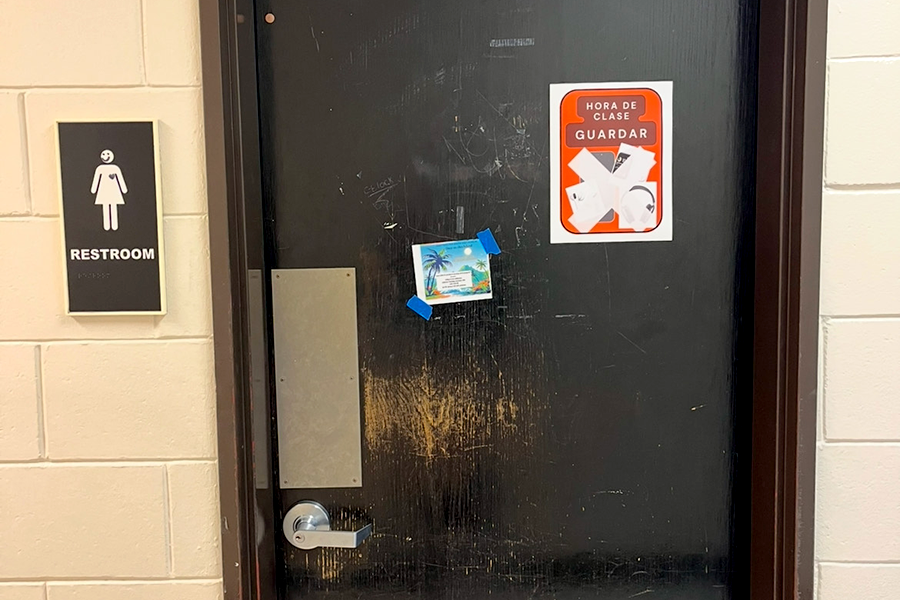On May 2, dozens of students piled into the media center during 5th and 6th hour, angry about rumors of security staff members being let go. Principal Cecilia Saddler listened as students took turns with a microphone and expressed their feelings of hopelessness.
“They’re leaving. They’re gone. We can’t do anything about it,” lamented senior Maryan Garane. Junior Vina Onyango-Robshaw echoed Garane: “There are things that are going to happen, and we can’t do anything about it.”
The students’ frustration stems from budgetary changes that will devalue the position of associate educators currently assigned to security, otherwise known as security staff members. Next year, the position will be “security monitor.” Associate Educator Paul Lundin explained that next year, the position would require less education and the salary would be smaller. “They’ve had to make cuts,” Lundin said. “It’s just a part of employment.”
Lundin continued to say that while his job has been excessed due to budget cuts, “It’s not a negative thing. In my particular job, they’ve devalued the position.”
While Saddler can’t speak to the specific cuts made to the security program at South, she did note that “every time positions are created, they’re created with students and staff in mind. It’s never easy when you’re coming down to conversations about someone’s livelihood.”
Despite the resigned attitudes of many students, there are some still trying to change the decision of the school. “We have a petition going around…and we are trying to get a group of students to the school board meeting,” said junior Sugei Leal. She said she hoped the petition could “persuade [the school board] to see that [associate educators] are an integral part of the community.”
Junior Amirah Ellison, who is working with Leal, said, “We just want the board members to know that [associate educators] are good at their job, and out of any staff members of any group in the building, they probably are the most effective as a whole in that all the students trust them and listen to them.”
“New security staff aren’t as effective as the older ones because they just don’t have the relationship with the students,” Ellison continued.
Associate Educator Manuel Castillo, known by many students as Mr. C, agreed emphatically. “We are the ones that are building bridges and relationships with you students,” he said. “It takes time to cultivate an environment, takes time to get to know students.”
Leal spoke to the effectiveness of the current security staff by insisting that “they’re one of the things that holds the school together.”
Ashley Ellis-Milan was hired as an associate educator in October and will not be able to return next year due to budget cuts. “I think I’ve made really good connections with the kids,” she said of her short time as a part of the security staff at South. “They feel comfortable talking to us.”
Even though she is left looking for a new job for next year, she said that “if the administration thinks [budget cuts] are going to better the school, then I’m all for it.”
The strong relationship between the security staff and students is the main reason students like Leal and Ellison are opposed to the cuts. “They’re good at their job, and there’s no reason to let them go,” Ellison explained.
Devaluing the position of associate educator, however, is not with malintent. “When you’re trying to run this organization, you have to look at every angle, and you try to come up with a good balance as best you can,” said Saddler. The school makes changes due to a new budget every year regarding things like class size and athletics. Security staff members are by no means the only staff affected by budgetary changes. “The intent was to do the best with what we had,” continued Saddler, “not to be dismissive or to devalue.”
Some of the initial dissatisfaction of students came from the confusion over what is happening next year. At the media center meeting, Onyango-Robshaw demanded that next time, students be more informed about budget cuts. “If we had known about this earlier, we could have done something about it,” she said.
Leal agreed part of the problem could be attributed to a lack of information. “I do sometimes think that the school board hides things from us that are going on in the school,” she said. “They may do it because they think it’s protecting us or it’s not our decision, but if this is happening, I would like to know about it as soon as a decision is made.”
Ellison agreed, noting, “There’s not a lot of communication coming from administration, nor from the board, so we only are going by rumors, which is rea lly unfortunate.” She said that while rumors are mostly where students have been getting information, “I’m really proud of what we’ve done, given our circumstances.”
Saddler emphasized that next year, there will be more student forums at which students can hear about changes in the school and voice their opinions. She recommends presenting ideas through student council and PUSH meetings, which are run by South’s Parent/Teacher Organization (PTO).
In addition to that, Saddler would like to develop a “principal advisory,” which would be made of several students that would meet consistently with her to discuss big picture issues. “I would continue to work on being a better communicator next year,” she said.
Despite hard work, the efforts of the petition and attempts to persuade the school board this year seem to be in vain. Many security staff members are resigned to leaving next year and have already applied to jobs elsewhere.
Lundin, for example, will be moving on to a new chapter of his life. “I want to do something a little different,” he said. He has applied to work at several other high schools, as well as South’s autism program. “I’d rather stay here if I could,” he stated, still noting that “once you get excessed, it’s like you’re starting all over again.”
Despite the inevitability of the security staff leaving, Castillo has hope that students will make change at South in the future. “It’s going to take a collective body of students to make a difference,” he said. “Collective is across the board, all cultures.”













